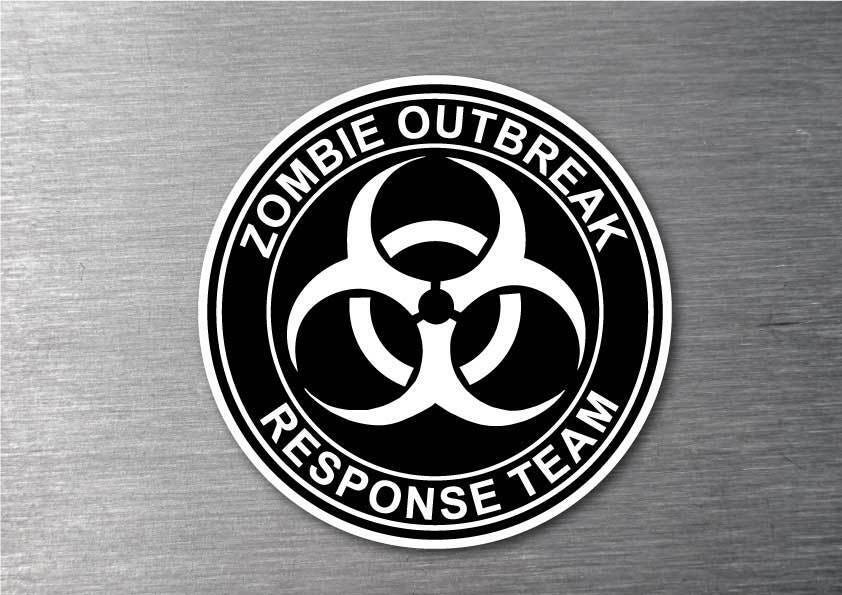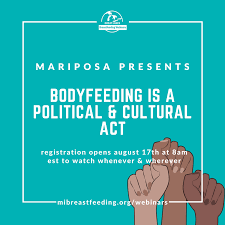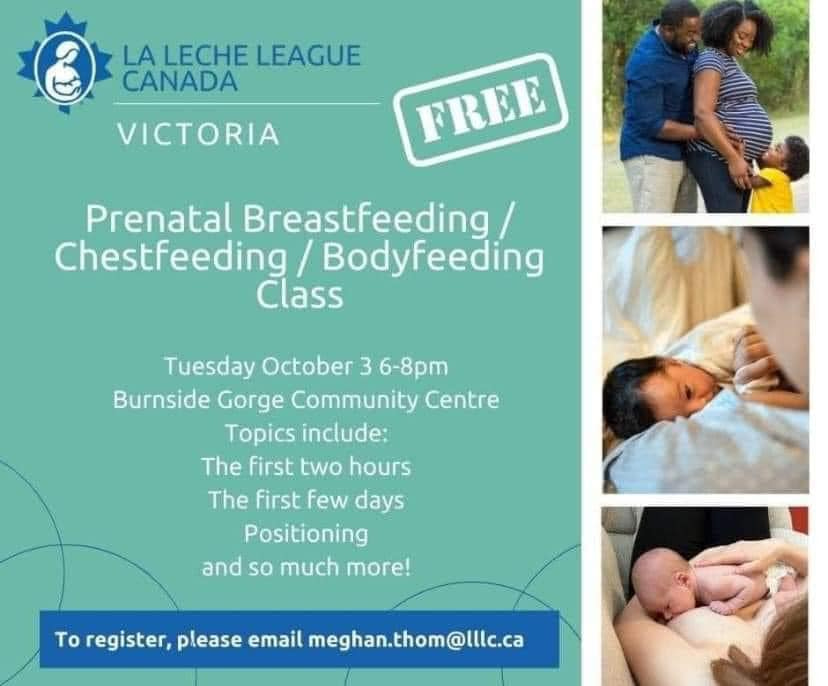Preparing For the Zombie Apocalypse
Is your body ready for feeding?
Just when you thought it couldn’t get any worse for breastfeeding advocacy, it does. Now another word enters the lexicon for breastfeeding support, ensuring that messages will be even more confused than ever.
If you thought that “chestfeeding” was bad…
Many of us abhor that clunky made-up bit of nonsense called “chestfeeding”.
The use of this term appears to come from this study, in which the lead author is a woman calling herself Trevor McDonald who identifies as a man. This small (22 participants) qualitative bit of research from 2016 has had an outsized influence for everyone involved in breastfeeding advocacy and support, thereby proving that timing is everything.
Talk about being in the right place at the right time; at a different point in history, this study would have disappeared without trace. It is used everywhere to justify the use of the term chestfeeding, but reading through this study leaves me scratching my head and wondering why.
From the 22 participants (all natal females), only 16 even attempted to chestfeed, four did not even try and two did not have a baby yet. Fifteen had chest masculinization surgery (AKA top surgery or elective double mastectomy of healthy breasts) which means their chances of successfully feeding their babies using their own milk hovered around 0% and this case report explains why.
The words they used to describe infant feeding were varied:
Study participants used a range of terminology to discuss feeding their babies from their chests. Six used the term breastfeeding, four spoke of nursing, three preferred to say chestfeeding, two used both breastfeeding and nursing, two said it did not matter, one used feeding and nursing, and one used feeding and mammal feeding. [Italics in original.]
So only three out of 22 transmasculine women chose to use the word chestfeeding over any other term they could have chosen. Twice as many referred to breastfeeding, six more used some combination of nursing and breastfeeding and two individuals said it didn’t matter what this activity is called.
Three out of 22; talk about having a monumental impact!
But if you read any articles, parenting mags or newspaper reports in general circulation, it is obvious that chestfeeding has become de rigueur in reference to universal breastfeeding. Because of course “inclusivity” is now more important than infant welfare. Those fragile “men” having babies need more protecting against those of us who don’t believe that sex is a social construction.
It is true that all human mammals have both a chest and two breasts and that these are not the same thing. A chest is a container, of both internal organs and for things (I am betting that most of you have a chest of drawers and a tool or sewing chest). Breasts are accessory organs of the female reproductive system because of their function and purpose. Men have nipples and breasts too, but these are remnants of fetal development and are not programmed to be functional (given that the function of breasts is to feed babies).
Chest and breast are not interchangeable terms in English. Swimmers don’t race using a cheststroke, no one wears double chested suits and radiologists don’t do breast x rays to look for lung cancer.
The female breast, especially physiologically complex during lactation, is not contained within the chest wall; our breasts sit outside the chest, on top of the muscles that overlay the ribs. It should be abundantly obvious that if babies are counting on chestfeeding for their survival, they are out of luck.
Any changes in the female chest during pregnancy are due to the size of the growing fetus and the structures that support the baby’s growth and development. The mother’s heart grows in pregnancy to cope with the increased blood volume needed to support fetal development, but as the fetus gets bigger, the space for other organs such as lungs, stomach and bladder decreases markedly, hence the typical pregnancy complaints of shortness of breath, heartburn and the insatiable need to continuously pee!
During pregnancy, estrogen causes proliferation of the alveoli and other hormones cause an increase in the number of ducts where milk will transfer out of the mother into her baby. In fact, most breast development is complete by the 16th week of pregnancy as a consequence of hormones produced by the placenta (which is fetal tissue) so the baby thus ensures the means of his/her own continuing nutrition/survival way before the baby could survive independently outside the mother’s body.
This physiological complexity of this is truly miraculous.
But of course, the use of chestfeeding has nothing to do with infant welfare because it’s nothing to do with what’s best for babies. Nope chestfeeding is for adults who can’t cope with biological realities. Chestfeeding is on a par with “ladydicks” for those who believe that unicorns poop out glitter.
Chestfeeding is an insulting term for many women, but as has become par for the course, it is women who are expected to do all the compromising as we are erased out of reproduction.
It’s not just us biology believers who don’t like this terminology, when the New York Times ran a language quiz in December 2022, chestfeeding came out last with 90% of the over 4000 participants stating this is not a word they would ever use. In contrast, only 15% would not use the word breastfeeding.
My main objection to the use of chestfeeding is that it is not universally defined or understood. I have seen chestfeeding defined using all of these examples:
a synonym for breastfeeding from a mother's breast
a baby breastfeeding from a mother using a Supplementary Nursing System (SNS)
a baby being fed at the nipple of a biological male using an SNS
a baby being fed at the nipple of a biological female using an SNS
a baby being fed in any way, with breast milk, formula, or a combination of the two while skin-to-skin on the chest of an adult
La Leche League International, when questioned about their use of chestfeeding, maintains that in their view, this is just another synonym for breastfeeding, and they point to their use of “nursing" as another synonym. Well good for them, but as they don’t run the world, unfortunately not everyone understands this new ‘rule’. This writer lists all the various manifestations of what chestfeeding may cover (and not all of them require any actual breastfeeding at all).
And if you are wondering if you are perhaps a bit too slow to follow the instructions of the trans lobby, this article about chestfeeding will not be reassuring:
They may be transgender folks who were assigned female at birth (AFAB) that now identify as men, or people who are non-binary. This means they don’t identify strictly as male or female or it might change from day-to-day.
I mean how the heck are us unenlightened cishetero people going to even get the correct pronouns going if a gender identity is going to be fluid enough to change from day to day? Sheesh, can’t it be made a bit easier for those of us who are just trying to be kind? Who knew that now that everybody can get pregnant and feed their babies using their breasts (whoops, sorry “chests”) that we could just forget all that nonsense around sex differences?
Ain’t modern life grand?
Of course, my main objection to using chestfeeding is that it muddles the public health messaging that parents rely on to keep their babies alive and well. Which is probably the reason why organizations such as the WHO and UNICEF don’t use this word, not even as an alternate term for breastfeeding. The words used in research studies and in public health messaging may influence the validity and/or reliability of both survey tools and results, which has an effect on results and practices.
In my last post I discussed the difference between human milk feeding and breastfeeding. A breast milk fed baby and a breastfed baby are not the same. The only way to accrue all the advantages of breastfeeding (which is the normal, physiological mammalian baby feeding method), is to breastfeed. Full stop, QED. Of course, feeding your baby with only your own milk is better than any other alternative, but if your baby is not breastfeeding you are not optimizing his/her health and long term well being (or yours either).
The term chestfeeding conveniently obscures this fact, which can have fatal consequences in the context of safe co-sleeping and for the babies of mothers who are HIV+. There is no room for linguistic errors when the transmission of a deadly disease can be the consequence of not understanding correct practices due to the use of unclear/ill-defined vocabulary.
A fate worse than death? Or just a woman in a gender-neutral world?
The word “neuter” has interesting origins. According to this source it comes from:
Late 14c., neutre, in grammar, of nouns, pronouns, etc., "neither masculine nor feminine in gender," also of verbs, "having middle or reflexive meaning, neither active nor passive," from Latin neuter "of the neuter gender," literally "neither one nor the other," from ne- "not, no" (from PIE root *ne- "not") + uter "either (of two)". The Latin word is probably a loan-translation of Greek oudeteros "neither, neuter." From 1520s it also had the sense of "taking neither side" which now generally goes with neutral (adj.).
As a noun from mid-15c., "the neuter gender;" by 1797 of certain animals (among bees, ants, etc.) that are of neither sex and incapable of generation.
We neuter animals all the time, mostly for convenience purposes. But we also know that just because we’ve had the family dog’s testicles removed, it does not make him no longer a boy dog, so we still tell him, “Good boy!" when he does something right.
And we don’t say that a woman who has had a hysterectomy is now a gender-neutral non-woman. Because we know that body parts don’t give us our humanity.
There is nothing gender neutral about any mammal; no gametes, no chromosomes, no body parts that are not clearly distinguishable as part of one or the other sex, which is so much more important that any of the seemingly infinite number of genders on offer in today’s world.
Those who refer to themselves as “nonbinary” aren’t because this is not a category that is available to mammals. Feelings and beliefs are wonderful things but for example you are only going to face the possibility of an unplanned pregnancy if you are a nonbinary female. Nonbinary males will never have to face this reality, ever.
Those who believe that humans can change sex or convert to a non-sexed state are suffering from delusional thinking. A delusion can be defined as:
A fixed false belief based on an inaccurate interpretation of an external reality despite evidence to the contrary.
You don’t have to think that you are really Napoleon to be suffering from a delusion, you just have to believe in something that is not true.
Using desexed or gender-neutral language for sexed processes and activities is harmful and can cause very real difficulties. It supports delusional thinking and behaviors.
Everybody has a body, so why should I care?
You know, on an individual level, I don’t care how you refer to yourself. If you want to tell others that your baby emerged through your “lady garden” or your “coochie”, rather than your vagina, well you do you. If you want to tell your friends about your man’s “custard launcher” or “package” to avoid the penis word, I can handle that too. What I can’t handle is health professionals, volunteer advocates and global health messaging that pretends that bodies are not important or relevant and using words that are confusing and obfuscating.
Misunderstood health messages can hurt people, when the intent is to help them.
Examples abound of the consequences of prioritizing so-called inclusive language over physiological facts. That’s how you get midwifery students in Scotland being taught how to deliver a baby through a penis, rather than the only way this works, which is through the vagina of a woman.
“Bodyfeeding”, just another way of catering to mental fragility?
The use of the even newer than chestfeeding term bodyfeeding is but another step along the Rainbow Path to oblivion.
This is made patently clear here. The raised fists in defiance (to what?) are a classic symbol of a rebellion staged to make some sort of point and an attempt to achieve some aim, but in the case of erasing the word “breastfeeding”, I’m wondering who is supposed to benefit from this.
In case you are confused, La Leche League is a place you can go for support, especially in the trans paradise of Canada.
Need specialist training? This organization runs Bodyfeeding Support Certificate Training, for the bargain price of CAD$450.00 for four zoom sessions. Other than having to learn a new and imprecise vocabulary, I am really wondering how this differs from standard breastfeeding supporters training? I mean, I am presuming that the bit of the body that babies are feeding from is still the maternal breasts or has queer theory been so effective that people can choose which bit of their bodies to use in infant feeding?
The most challenging thing I have ever done was to become a mother. Children stretch their parents right out to the edge of their limits and sometimes beyond. If your starting point in parenting is needing everyone in your world to accommodate you continuously in realizing your unreasonable worldview, life is going to be fairly grim and ultimately unattainable.
Wait, not everyone is onboard the trans/nonbinary express!
Recently, the Journal of Human Lactation (JHL) published an interesting study. The purpose of the research was to determine the acceptability of gender-inclusive language in the field of human lactation research and clinical care. It should be noted that this journal is fully captured by the rainbow people, despite the fact that breastfeeding is a sexed, not gendered activity.
All of the survey participants were female, but not all identified as “women”.
The results were instructive because it was found that these female people were largely OK going along with some forms of gender inclusive language, such as substituting “parents” for mothers, they were not too happy about either chestfeeding or bodyfeeding.
However, the proposed revised language changes prompted stronger opinions. Most people had a low acceptance of “chestfeeding” and “bodyfeeding.” For example, one participant responded:
Participant: I probably wouldn’t have taken the survey. I don’t like the statement chestfeeding but that’s just my opinion.
Interviewer: Okay. If you saw that as one of the early questions, you would just stop taking the survey?
Participant: Yes. I probably would have rolled my eyes and just exited out of it.
Some of the pushback against bodyfeeding was stronger. One participant stated, “Yes, it just makes it sound so odd and foreign. Bodyfeeding, I don’t like it. It’s almost uncomfortable, it doesn’t sound natural.” Another associated the term with intensely upsetting experiences and strongly rejected the term:
Bodyfeeding is something I don’t ever want to hear because coming from somebody who’s been raped, my number one image that conjures is something I don’t want to think about. Bodyfeeding is not something that you should ever put out there, especially if you have people—women, like myself, who are pregnant, who have also been victims of sexual assault, domestic violence, any of that. It’s a very triggering term. If I saw that on a piece of paper, that would make me want to throw that paper away.
So, by the study authors’ own admission, “most people” were not happy or comfortable substituting those meant to be “inclusive” terms chestfeeding or bodyfeeding for the familiar and understandable word, breastfeeding. Perhaps that’s because “most people” are not living in a delusional state that posits that “everyone” can get pregnant and feed a baby? And as one participant clearly stated, bodyfeeding makes her feel assaulted all over again.
Catering to the few can exclude the many
Everyone I know believes that other people deserve respect, dignity and recognition. But no one has the right to demand that everyone else validate their chosen lifestyle. If your Uncle Harry believes that he is the new messiah and that others must literately bow before him, he may be out of luck.
The maternal mortality rate in the USA is in fourth place, sandwiched between Costa Rica and Latvia on a table where being near the top should be considered shameful. If some of the billions of dollars being spent on the less than 1% of the birthing population that refuses to acknowledge their biological sex (and indeed believes that facts are nonexistent) were spent on maternal health measures, think of all the lives that could be saved.
The costs of not breastfeeding are truly astronomical and impacts every society at every level. and the use of fictional terminology such as chestfeeding and bodyfeeding are evidence that this is not about diversity and inclusion, but is more about delusion and exclusion.
This is not a cost that we should be supporting. Let’s leave the bodyfeeding to the zombies, where it belongs.






The only way trans activists can make this nonsense not seem like nonsense is to change the language. It doesn't wash, of course, because there are certain words that have never changed, until now, for a very good reason. They are not the sort of words that evolve according to a changing culture, because what they refer to has remained a stable concept since forever in every culture. The words the trans activists are trying redefine, or make up, are being forced on us, and not organically evolving or emerging, and eventually all regimes which try to forcefully indoctrinate their citizens by twisting the language and changing the meaning of words fail.
The term Body feeding makes me want to throw up.